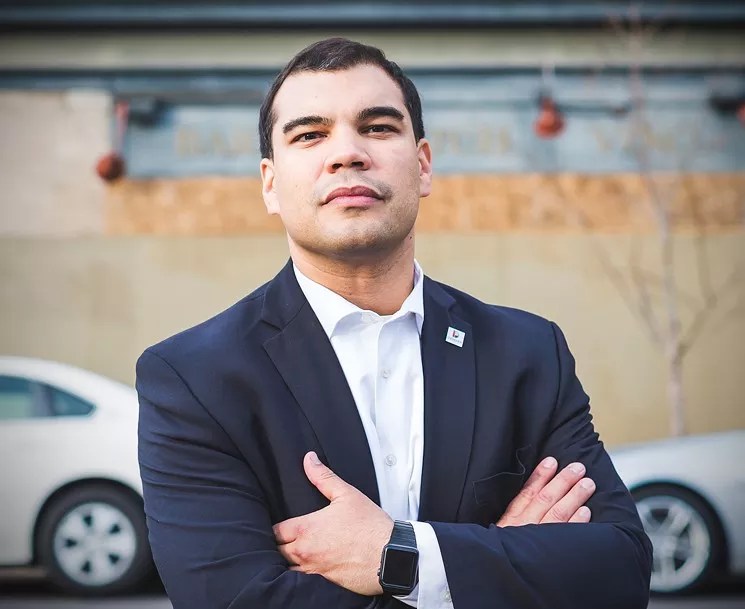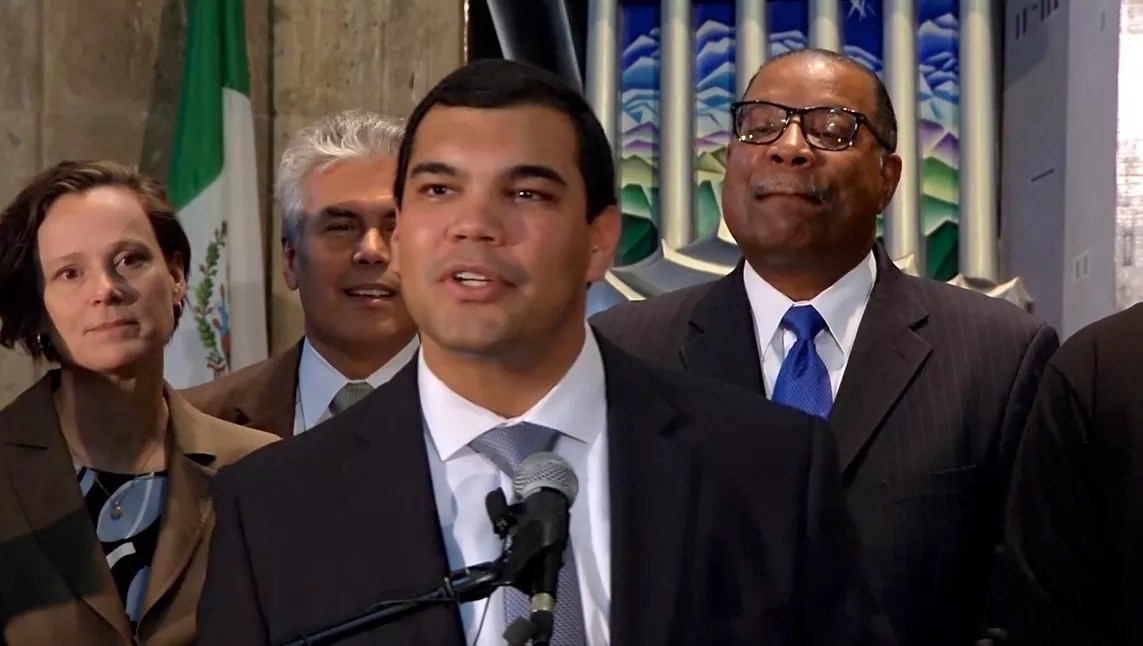
Jake Holschuh

Audio By Carbonatix
Erik Soliván, the city’s point person coordinating housing investments and homelessness services, announced his resignation in February. Appointed by Mayor Michael Hancock in January 2017, Soliván headed a new office called HOPE, short for Housing and Opportunities for People Everywhere. Soliván was also a principal architect of Denver’s five-year housing plan, the city’s main response to its growing affordable-housing crisis. For some, Soliván’s departure came as a surprise; a letter of resignation he submitted to the mayor did not offer many clues as to his motivations for leaving, although the announcement came only a month after the Hancock administration decided to fold the office of HOPE into the Office of Economic Development.
Last week was Soliván’s last as a City of Denver employee. On Wednesday, March 7, he sat down with Westword for a full exit interview.
Westword: Even after your resignation letter, I think there are still some questions about what motivated your departure. What else can you tell us about leaving the city after establishing the HOPE office and leading it for approximately thirteen months?
Erik Soliván: I think my resignation letter speaks for itself, and the office had a lot of accomplishments. But as the city went forward with restructuring – merging the HOPE office with the Office of Economic Development, which I support – there was an opportunity for me to step back from the work and find another pathway into supporting and addressing the city’s housing challenges and maximizing some opportunities.
So are you saying that you feel like you can make a greater impact somewhere else, rather than with the city?
I think I can make an impact through a number of different ways. As the restructuring went on, I saw it as an opportunity to ask: What is another way in which I can participate in this work, still be a voice in this work, and address the city’s housing needs?
It sounds like you’re going to stay in Denver, then. What can you tell us about your next move?
I’m looking to stay in Denver and in Colorado and still find ways to be a part, and have a voice, in this work. I love this city. And in addition to the housing challenges in [Denver], there are housing challenges in the mountain communities as well, like workforce housing. There’s no shortage of challenges, and I hope that my expertise is valuable somewhere.
Has anyone come knocking? Can you share any specific positions or organizations that you’re considering?
There’s nothing specific at this point that’s far enough along that I can say, “Hey, here’s my next move!” I wish there was. But I’ll say there are initiatives and opportunities within Denver as well as up in the mountain communities. I’m also thinking about ways I can provide assistance to various projects, even with things at the state [level], like rental applications and the Right to Rest bill.

Interesting. So in a capacity outside of the city, you’re going to weigh in on the Right to Rest Act – also known as the Homeless Bill of Rights – that’s being considered by the state legislature later this month?
Right to Rest has a long history, and as I think about the bill and what the city’s absolute need is to balance public safety and health, while also recognizing that we have an immediate need around people experiencing homelessness, it raises the question: How do we address that need? Denver is experiencing a challenge with all of its growth and prosperity. We’re not able to provide pathways for accessing that growth and prosperity for all individuals. We’re not providing the housing options that are needed. So I’m trying to provide some thinking and some innovation on how to do that – not just bringing in city, state and foundation dollars, but creating new pathways for addressing this immediate need.
What can you tell us about what’s happening to the HOPE office, which you started and shaped, given the city’s restructuring of departments, which includes HOPE being moved under OED?
I hope the HOPE office continues. And I hope the office continues to make the vital connections we need with foundations and employers and external parties, as well as within the city, harnessing our resources.
Will there be any reduction in staff? Are all the people you oversaw keeping their jobs?
The very small staff that I had was merged with OED, and again, I hope the HOPE office continues.
There is currently a job vacancy under OED for a “Chief Housing Officer” with a job description that includes some duties you performed at HOPE. But for now, your staff is being overseen by OED’s Eric Hiraga, the former chief of staff at Denver International Airport – an airport expert. Do you think he’ll have what it takes to continue advancing your work in the interim?
Eric – yes, his name is also Eric – is a strong leader, and he and I have spent a lot of time together sharing knowledge and experience as he looks to address these needs. I support the restructuring he’s done, and I hope that it can continue to move forward as I step back and find another way to address these needs.
There was some excitement back in May 2017 around the thirty “action items” that your office announced, including things like exploring tiny homes as a housing solution. What’s happening to those thirty action items?
Of those thirty action items, thirteen were completed, about four or five were included in the five-year housing plan, and thirteen others are ongoing now.
Okay, so those are not disappearing?
Not at all. They’re still ongoing.
What do you consider the greatest accomplishments of your time at HOPE?
We were able to launch the LIVE Denver program, we were able to launch the eviction-diversion program, we were able to draft and launch a comprehensive landlord-tenant guide, and we were able to launch the Smart Cities initiative at 23rd and Lawrence, as well as bring together partnerships within and outside of the city. So that’s a lot of successes.
Are there going to be changes to any specific programs now that you’re leaving and HOPE is getting folded into OED?
I hope that the work in LIVE Denver continues. The focus there was really on workforce families, and we had buy-in from employers like St. Joseph’s and others, including the apartment association and foundations. I am very hopeful that will continue to move forward expeditiously, because it’s a way to address the missing middle of housing needs in the city.
Are there things you didn’t get done at HOPE that you wish you had?
I wish I had more success at bringing our city’s departments together. That’s a tall order to do. Especially some of the larger departments, like the Department of Human Services and Office of Economic Development, that touch our spectrum of work from homelessness to housing. I think part of my challenge was not being able to push the bar far enough to bringing that work closer together. It’s tough work trying to break down silos. A lot more needs to be done, so as we continue moving forward, there will be greater alignment between departments to make impact investments. I’m hopeful that will happen.

Mayor Michael Hancock had worked closely with Erik Soliv
Jake Holschuh
So is it fair to say that it was a frustration that the lines of communication between various departments weren’t as clear as you would have liked?
Yeah, communication can always be improved. That’s without a doubt, whether it’s internally or externally. Part of the intentionality of the office of HOPE was to try and open up those lines of communication. And there was some success there, but not enough. So there are lessons learned for me as I move forward to my next challenges and opportunities.
The mayor and I met on Monday morning [March 5] and I shared with him a debrief of what the opportunities and successes were, as well as some of the challenges. Communication across the departments is something that needs to be improved. And it’s not just here in Denver. That’s applied to every city that I’ve worked in.
Does your departure mean anything for the five-year housing plan? I know that you were one of the main cooks in the kitchen on that plan. And not to put words in your mouth, but I’m sure it was something of your baby. Now Denver City Council seems to be much more involved and has suggested some revisions. Are you worried about what’s going to happen to the plan now that you’re no longer a city employee?
Without a doubt I was one of the primary authors of the plan, and I think it is well-recognized that the city can’t build its way out of our housing issues. I think the plan was strong in its attempts to bring together the city’s work across the housing spectrum. The challenges will come as the plan gets implemented on a yearly basis through the yearly action plans – how swift those plans are and how much the city can invest in order to move the bigger plan forward.
Also, community activists and advocates can inform experts. That’s totally needed, because as you look at the work of our nonprofits in our neighborhoods, they are on the ground and know the needs of our city. So where the city can expand the support for our nonprofits, that’s going to be the signal of the success in implementing that plan.
You mentioned gentrification earlier. Given your time here, what are your thoughts on the affordability of Denver going forward? Are you optimistic about this city remaining accessible?
I still have hope, that’s for sure. I also think the city of Denver is very much at a crossroads. The latest report is that the median sales price for a single-family home in Denver has reached $500,000. So it costs a half-million dollars to buy into Denver, and that creates a challenge. There was an article I just read about San Francisco and how there is a mass exodus there. But one of the problems they’re having is that the cost of renting a U-Haul truck is $2,000 to $3,000. So that’s like a tax to get out of San Francisco. That’s not the path that Denver wants to go. I think we need to recognize that housing stock exists not just in north Denver, but in southwest Denver and southeast Denver. We need to make sure that we can maintain middle-class families that are here and don’t get to a level like San Francisco.
The other question around gentrification is how do we plan for the next wave of a neighborhood? They change all the time. As we think about the intersections of land use, housing, transportation and small businesses, what is the neighborhood that we want? The city of Denver is coming into its own with names like LoHi and SloHi and all these other two-syllable names as neighborhoods are popping up. But what are the neighborhoods we desire? I think the Denveright plan is doing good work in shaping some of the conversation, but more work needs to be done to maintain respect among neighbors and maintain housing costs.
A last, easy question: Have you been able to do anything fun with your newly found free time?
I’m going to grow out a beard and disappear into the mountains [laughs]. No, I’m just kidding. But I am going to get into the mountains. That’s something I’ve been meaning to do for a while but haven’t had the time.
Thanks, and good luck in the mountains.